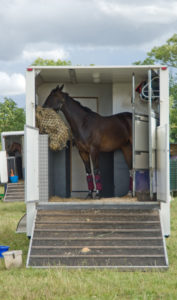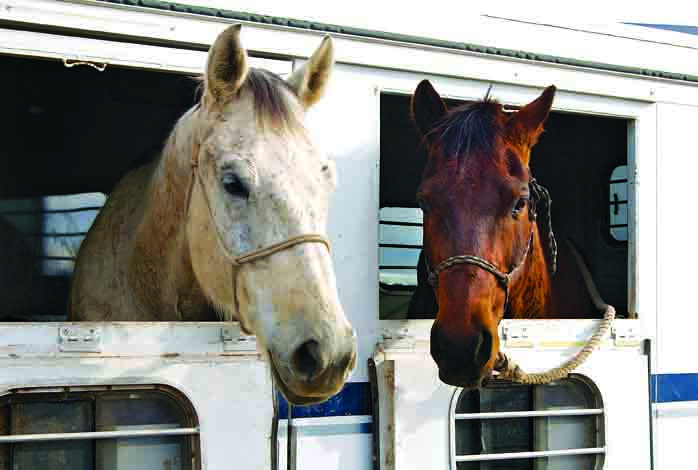Does your horse paw, kick, or thrash around while he’s in the trailer? This destructive behavior, also known as trailer-trashing, can be can be reshaped with a little time, effort and understanding.
Most horse trailers receive some damage when we haul our precious equine cargo. The extent of the damage varies from small dents across the wall caused by pawing or kicking, to broken-out windows or bent divider bars. Some horses can outright trash a trailer. Owners usually end up living with the damage rather than spend good money for repairs, only to have their horses tear it all up again on the very next trip!
The greatest disappointment is missing out on an equine event with friends because you don’t want your horse to trash someone else’s trailer. Worse, you may not even get invited because no one is willing to risk their trailer even if you offer to pay for any damages!
Understand why your horse is unhappy
As a horse behaviorist for more than 20 years, I’ve coached owners and their horses in every kind of trailering scenario you can imagine – with high level performance or recreational horses, untouched mustangs, ponies, mules, you name it, and with every kind of horse trailer. My conclusion from these experiences is that regardless of the horse, trailer or severity of behavior, trailer-trashing can most effectively be turned around by expanding our foundation of communication with horses!
Whether the horse is lightly pawing or throwing himself on the floor, the message is the same — he simply doesn’t want to be in the trailer. It’s an opportunity, and dare I say it, our obligation to help him gain confidence so we can build a happy hauling environment.
I want to stress that a magazine article cannot possibly explain the extent of the techniques required to fully change the mind of a horse committed to trailer trashing. What can be explained is the origin of this behavior, how common approaches contribute to it, how we can begin to shift the behavior by looking at it a little differently, and go from there.
Take another look at trailer loading
That being said, it’s my opinion that trailer trashing is fairly common because most instruction is focused on trailer loading. We can’t go anywhere if we can’t get the horse into the trailer, so every approach under the sun is geared to resolving the initial problem of getting that rascal into the trailer. When the horse finally does load, we quickly close the doors and we’re done, right? Then the pawing starts and we don’t really know what to do except get to our destination quickly to keep damage to a minimum!
Even the horse that walks right into the trailer and seems completely okay might become a huge trailer trasher once everything goes into motion. “Good” loaders might scramble in every turn or start pawing or rocking when the trailer stops, simply expressing that they want out. Owners often brag that a horse is “perfect” in the trailer, but you’d better be out of the way when you go to unload and the horse blasts out backward or slams through dividers or people on the way!
Trailer loading with confidence
It’s important to consider what all these behaviors have in common. The horse is either confident and relaxed in the trailer, or he isn’t. When “training” is focused only on getting the horse in the trailer, we need to keep in mind that while his body might be inside, his mind is still outside. Every undesirable behavior is an expression of the horse wanting to be outside the trailer.

The approach I find most effective for both owners and horses is to think about loading the “mind” of the horse, because the body will follow the mind. And yes, the horse is a living, breathing, thinking, feeling creature that certainly has opinions and the raw physical power to express them!
When we recognize that the mind of a prey animal is designed by nature to avoid anything that restricts flight from perceived danger – it’s his number one survival mechanism — it’s pretty amazing that horses load into moving metal “caves” at all, and is a true testament to their ability to adapt to our world! Conversely, it’s human nature to think that shutting a horse in right away is only logical — like catching our prey — so it’s easy to see how he might respond by feeling trapped. This feeling can be expressed in degrees ranging from mild, uneasy pawing to extreme panic with the most horrific efforts to exit the trailer.
If I had a nickel for every time an owner came running to shut a trailer door the instant the horse’s back hooves disappeared into the trailer during a demo or clinic, I’d have my own island! Leaving the door open and allowing the horse to back out or turn around and walk out leaves both owner and horse with a funny look on their faces. But I like to give the horse a minute to think about what just happened, and begin my loading routine again. Something as simple as allowing a horse to come out of a trailer, and reloading enough times that he proves to himself there’s no danger, can become a real turning point for even the most committed trailer trasher! What really surprises folks is how quickly most horses make their own decision to stay in the trailer, because getting out only leads to getting back in, and hey, nothing’s hurting them in there anyway.
It’s common to think we don’t have that kind of time and that the horse should just get used to the trailer as we roll down the road. Luckily, many horses do get used to things and seem to “get over it”, but some don’t and then we’re dealing with irritating, costly, even dangerous behavior, while blaming the horse all the way down the road.
The loading techniques I’m describing are pretty extensive and best learned in stages, beginning with groundwork, moving to obstacles to create simulations, and then to the trailer. Of all my instructional DVDs, Trailer Loading for Women (and men, of course) gets the most feedback. Trailer loading and trailer trashing are common struggles. Folks from all over the world email to tell me how their impossible-to-load, trailer-trashing horse now calmly steps into the trailer with relaxation and confidence — and in only a few, or even one, session! These are horses that have had trouble for years; but with clear communication that makes sense to a prey animal, they now happily roll down the road behind the owners and fully enjoy their next adventure. So you see, you don’t have to just grit your teeth and live with a trailer-trashing horse. With a little time, effort and understanding, you and your horse can both have an enjoyable trailering experience!
NOTE: As with any approach to shaping horse behavior, safety is the highest priority! I cannot emphasize this enough: if you do NOT feel confident at any time, please hire a professional who understands this approach and will take the time to help you and your horse to a stage where you feel confident enough to take over.








